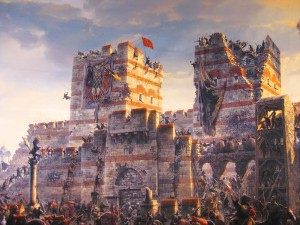Memorial Day, 1453
Greeks are in a bad mood today, and the reason has nothing to do the economy. This is the anniversary of the Fall of Constantinople and a day of mourning.
By 1453, Byzantium was an empire in name and memory. It once had been the greatest power in Christendom, extending from Italy to Mesopotamia. Now, it was reduced to a ruined city and a few remnant outposts on the Greek mainland. Its emperors bore a revered title that dated to Constantine, but they wore crowns with paste jewels. Yet, built on an easily defended peninsula , and guarded by the most formidable walls in Europe, Constantinople had defied attack for 1000 years. The Ottoman Turks had conquered the Balkans, but they had learned through past failures to avoid Constantinople.
Mehmed II wanted the imperial city for his capital. The Ottoman Sultan gathered an army of 80,000 men, nearly twice the size of the population of Constantinople. His siege equipment included the largest cannons in the world. Furthermore, he created a navy to blockade the port city. Against this force, Constantinople had a garrison of 7000 men, Greeks and their Genoese allies. Christendom was prepared to mourn Constantinople but not help her.
Nine years earlier, a Christian army led by the King of Poland embarked on a crusade against the Turks. This crusade ended at the battle of Varna, when its 20,000 men confronted the Sultan’s 80,000. By the end of the day, the King’s head was on a pike, and the rest of his army did not look much better. Catholic Europe could barely defend herself against the Ottomans; she could not help the Greek Orthodox of Constantinople.
Yet, however much in decline and decay, the city defied conquest. Its formidable walls withstood the Turks’ onslaught and eight weeks of siege. Four times the Turks, with their overwhelming numbers, attempted to storm the city; and each effort was a bloody failure. You can still see headstones of the fallen Janissaries outside the walls of Constantinople. The Sultan’s engineers attempted to mine the walls; the Byzantines mined the Turkish mines. You can’t outfox a Byzantine. In his frustration, and quite contrary to his nature, Sultan Mehmed offered to negotiate. To us, his terms were not all that generous; he would spare the city if it surrendered. Keep in mind, however, that his soldiers expected to loot the city. Sparing Constantinople, the Sultan would be paying off his disappointed horde out of his own coffers.
But Constantinople refused to surrender. Despite its decline, the old capital still trusted in Heaven’s protection and its imperial destiny. The Turkish war council was starting to come to the same conclusion but then Heaven seemed to show a Moslem bias. On May 23, 1453, there was a lunar eclipse, and the Turks were heartened to see a crescent moon matching the one on their flags.
The fifth attack was on this day, May 29th. Constantine XI, the last Emperor of Byzantium, removed his imperial insignia before leading his men into their last battle. He would deny the Turks any way of identifying his body and making a trophy of it. The Sultan attempted to curtail the rampage of his victorious soldiers, protecting the city’s major churches and buildings. As he instructed his soldiers in the etiquette of looting, “the people are yours but the city is mine.” Even then, he only allowed his men a full day of looting; after that, Constantinople–and any surviving citizens–were under his protection.
The Sultan was only 21 and he would go on to conquer Serbia and Romania, and he was beginning an invasion of Italy when he died in 1480. But he is remembered chiefly for conquering a decaying old city and then restoring it to its grandeur. Constantinople indeed did have an imperial destiny, and for the next 450 years it would be the capital of the Ottoman Empire.
Today the city is known as Istanbul, except on Greek maps. There the name defiantly remains Constantinople.

That’s nobody’s business but the Turks’.
Thanks, Eugene.
You do the Byzantines proud in upholding their memory. You’ve written some witty stuff, some funny stuff and always smart stuff. This, however, stands apart: a beautiful memorial to bygone greatness. It reads like the treatment to a movie far better than that thing from a few years back that had the guy who played the Tolkien elf singlehandedly almost saving the Outremer
You are referring to “Kingdom of Heaven” which is quite a good film–despite the dubious presence of Orlando Bloom. He is so thin that he could slip through chain mail. The Byzantines would have been in the background of the story. In fact, a few of the extras were dressing in such refinement that you might that conclude that they were from Byzantium. The Crusader states had diplomatic relations with Constantinople; some were nominally fiefs of Byzantium.
The Kingdom of Heaven takes place before the Third Crusade; indeed the film recounts how Saladin regained Jerusalem. It was the Fourth Crusade–some 25 years later–that sacked Constantinople and destroyed the Byzantine Empire. What the Greeks eventually regained were the city itself and a few fragments of territories of the once great empire.
Orlando Bloom would crumple under the weight of the thinnest of chain-mail and would wet his trousers at the sound of the first war horn.
Considering the standards of medieval hygiene, hosing your hose would have been quite conventional among soldiers on the march. In the desert climates, the Crusaders might have appreciated its cooling sensation.
Eugene
P.S. Does anyone ever view the fall of Constantinople as payback for Troy? You and I being students of irony, I couldn’t help noting the inverse similarities.
Χαλάζι Ευγένιος – υπέρτατη χρονογράφος του Βυζαντίου!